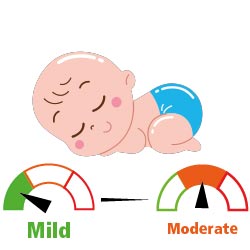Rx
Notes
In emergency
Disease annotations
Rx
- Avoid exposure to allergen
In excessive nasal secretions (Rinorrhea,sneezing,itching):
- Anallerge 2mg/5ml syrup 2.5 ml liquid medicine) every 4-6 hours
In nasal obstruction:
- Decozal 0.05% spray /drop 1drops in each nostrils up to 3 times daily
Notes
Chlorpheniramine
Available forms:
- Allerfin: 4mg tab, 10mg/ml ampule, 2.5mg/5ml syrup
- Anallerge: 4mg tab 2mg/5ml syrup
- Chlorohistol: 4mg tab
Therapeutic indications:
- symptomatic control of all allergic conditions responsive to antihistamines, including hay fever, vasomotor rhinitis, urticaria, angioneurotic oedema, food allergy, drug and serum reactions, insect bites.
- Also indicated for the symptomatic relief of itch associated with chickenpox.
Method of administration:
- Adults: 4 mg (1 tablet or 10 ml) every 4-6 hours. Not more than six doses (24 mg) a day if under 65 years of age, or more than a total of three doses (12 mg) a day if over 65 years.
- Children aged 6-11 years: 2 mg (5 ml) every 4-6 hours. Not more than a total of six doses (12 mg) a day.
- Children aged 2-5 years: 1 mg (2.5 ml liquid medicine) every 4-6 hours. Not more than a total of six doses (6 mg) a day.
- Children 1 year-23 months: 1 mg (2.5 ml liquid medicine) twice daily, preferably morning and evening
Contraindications
- contra-indicated in patients who are hypersensitive to antihistamines or to any of the tablet ingredients.
Pregnancy
- There are no adequate data from the use of chlorphenamine maleate in pregnant women. The potential risk for humans is unknown. Use during the third trimester may result in reactions in the newborn or premature neonates. Not to be used during pregnancy unless considered essentially by a physician.
Lactation
- Chlorphenamine maleate and other antihistamine may inhibit lactation and may be secreted in breast milk. Not to be used during lactation unless considered essential by a physician
Side effects :
- Sedation
- drowsiness, dizziness, blurred vision and psychomotor impairment
- Nausea, dry mouth
Disturbance in attention
Otrivine
Otrivine Nasal Spray contains the active ingredient xylometazoline hydrochloride which helps to open up and clear the nasal passages by reducing the excessive nasal secretions and returning the swollen blood vessels to their normal size.
Used in :
- nasal congestion (blocked nose, including colds)
- allergic rhinitis
- sinusitis.
- Not used>5 days Cause rebound congestion
Pregnancy : not recommended
Available forms:
- Otrivin 0.1% spray/drop , .05% spray /drop
- Decozal 0.1% spray/drop , .05% spray /drop
- Xylomet 0.1% spray
Dose:
Adult
- 0.1% Nasal drop 2-3 drops in each nostrils up to 3 times daily
Child>6y
- 0.05% Nasal drop 2-3 drops in each nostrils up to 3 times daily
Child 6months-6y
- 0.05% Nasal drop 1drops in each nostrils up to 3 times daily
In emergency
In Emergency room:
- Give Antihistamine In sneezing and rhinorrhea :
- Allerfin 10mg/ml IM injection :
Dose:
- 1-5 year : 25-5mg (½ ml )
- 6-12 year: 5-10mg (1ml )
- Adult : 10-20 mg (1-2 ml )
- Give Dexamethasone 4mg/1ml
Dose:
Pediatrics:
- 0.3 mg/kg/day IV / IM divided q6hr or q12hr
Adult:
- 4-8 mg IM /IV
Disease annotations
Allergic rhinitis
Presentation :
- Rhinorrhea
- Repetitive sneezing
- nasal congestion, obstruction
- postnasal drainage
- Pruritus
- Itching of the palate, nose, ears, eye
- Snoring
- Frequent sore throats
- Cough
- Headache
- Itching redness watery eyes
Lines of management :
- Avoid exposure to allergens
- In excessive secretions and sneezing: oral antihistamine
- If nasal obstruction: Nasal decongestant
- For ocular symptoms: intranasal antihistamine
- If Symptoms persist and affect quality of life: Intranasal Corticosteroid
- Sever and persistent symptoms: Intranasal Corticosteroid + oral or intranasal antihistamine+ Oral leukotriene receptors antagonist
